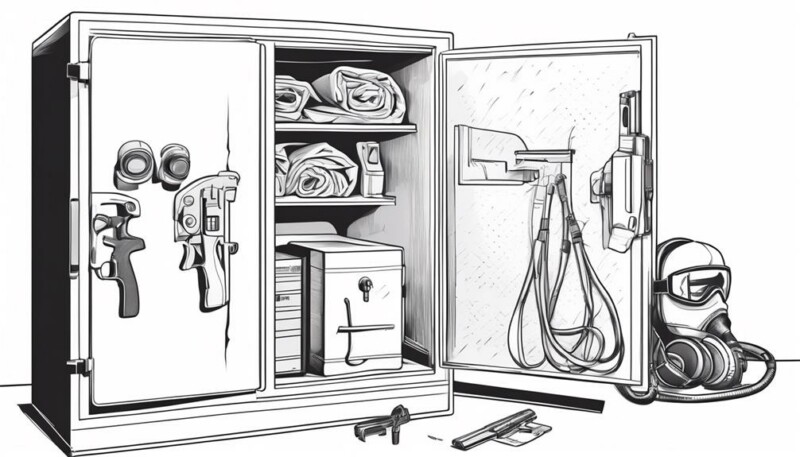Did you know that nearly 40% of American households reportedly own at least one firearm?
If you're among the first-time gun owners adding to this statistic, it's essential you're well-versed in the key laws governing firearms and vital safety tips. You must be aware of the significant responsibilities that come with owning a firearm, including understanding your local gun laws, which can vary widely.
From the basics of gun handling to the specifics of secure storage, the world of gun ownership demands thorough knowledge and continuous learning.
Why not join us as we explore these crucial areas, ensuring that you're not only a legal gun owner but also a safe one?
Key Takeaways
- Research and understand specific firearm laws and regulations in your area, including preemption statutes and prohibited categories of individuals.
- Seek guidance from local authorities, gun range professionals, and firearm experts to ensure compliance with laws and regulations.
- Prioritize gun safety by practicing the four rules of gun safety, treating every firearm as loaded, and maintaining trigger discipline and muzzle control.
- When purchasing a firearm, research legal requirements in your state, determine if a permit is needed, consider the purpose of the handgun, and compare different firearm features.
Understanding Firearm Laws and Regulations

Ever wondered about the specific firearm laws and regulations in your state, county, or city? As a first-time gun owner, it's crucial to familiarize yourself with these to ensure compliance and safety. Understanding firearm laws and regulations can seem daunting, but it's an essential part of responsible gun ownership.
Start by researching the specific firearm laws and regulations in your area. Be aware of preemption statutes that can restrict local governments from imposing additional gun ordinances. This knowledge will be essential when purchasing your first firearm, as it can affect your ability to legally own and use a gun.
Next, familiarize yourself with prohibited categories and persons who are restricted from possessing firearms under federal firearms laws. This can include certain convicted felons, persons with restraining orders, and individuals with specific mental health diagnoses.
Lastly, stay updated on laws regarding firearm possession, carrying, and storage. Local gun laws can change, and staying informed is key. Seek guidance from local authorities or gun range professionals for further assistance.
Essential Gun Safety Measures
Navigating the world of gun ownership, it's critical that you prioritize safety measures, always treating every firearm as if it's loaded until you've personally and visually confirmed it's not. This is a fundamental rule in the realm of firearm training and a must-know for anyone planning to purchase their first gun.
Another basic gun safety rule is maintaining trigger discipline and muzzle control. Never let your firearm point at anything you wouldn't want to destroy. This way, you'll ensure safe gun handling.
Below is a table summarizing key safety measures:
| Safety Measure | Description |
|---|---|
| Treat as Loaded | Always consider the firearm loaded until you've checked. |
| Muzzle Control | Don't point the gun at anything you wouldn't want to destroy. |
| Trigger Discipline | Keep your finger off the trigger until ready to shoot. |
As a responsible gun owner, you should have a proper understanding of the laws and regulations regarding firearms. This not only includes knowledge about safe firearm use, but also the specific laws in your local jurisdiction. With these gun safety measures in place, you're taking the right steps towards responsible ownership.
Purchasing Your First Firearm

Buying your first gun is a serious decision that involves careful consideration and understanding of firearm regulations. You must first select the right firearm that suits your specific needs and budget, while also complying with all local and national laws.
Equally important is having the necessary documentation for your purchase, to ensure you're abiding by the law and respecting the responsibilities of gun ownership.
Choosing the Right Firearm
Before you purchase your first firearm, it's essential to research the legal requirements in your state, determine if a permit is needed for the specific type of handgun you desire, and consider the purpose of the handgun.
For first-time gun owners, choosing the right firearm involves several key steps:
- Identify the specific type of firearm for your needs, such as personal protection or sports shooting.
- Compare firearm features like size, weight, and caliber at gun ranges.
- Visit firearm shops to handle different guns before buying.
- Familiarize yourself with firearm magazines and safety tips.
Understanding Firearm Legislation
To ensure responsible and legal firearm ownership, it's crucial to thoroughly understand your local and state firearm laws before making your first purchase. As first-time gun owners, you need to be aware of key laws and regulations regarding firearms.
Understanding firearm legislation isn't just about legal possession and ownership, it's also about promoting safety. Local gun shops, law enforcement agencies, and firearm experts can provide invaluable guidance.
It's also essential to familiarize yourself with the four rules of gun safety. These rules, along with federal and local laws, shape the foundation of responsible gun ownership.
Necessary Purchase Documentation
Having grasped the importance of understanding local and state firearm laws, it's equally crucial to know the necessary purchase documentation required when purchasing your first firearm. Here are some steps to follow:
- Check your local laws: State and local regulations vary. Some may require a law enforcement permit or other documentation or firearms permits.
- Apply for a Purchase Permit: This is crucial to legally purchase your first firearm.
- Understand federal laws: Federal and local laws may require different permits or documentation needed.
- Keep it legal: Ensure all transactions are private legal sales.
Firearm Storage and Maintenance

When it comes to owning firearms, it's crucial that you store them securely and maintain them regularly to prevent unauthorized access, accidents, and theft. As a first-time gun owner, understanding firearm storage and maintenance is key to ensuring safe gun handling.
For firearm storage, consider using a gun safe or lock box. It's also advisable to store your ammunition separately to enhance safety. Always remember, the goal is to prevent unauthorized access while ensuring the gun is accessible if you need it. Your family members should also be educated about gun safety to foster a responsible culture at home.
In terms of firearm maintenance, you should clean your gun regularly. This involves handling your unloaded gun with utmost care, following the manufacturer's cleaning instructions. Regular maintenance not only enhances gun safety but also ensures optimal performance of your firearm.
Training and Practice for Safe Use
Mastering the safe use of your firearm involves regular practice at a local gun range, where you can hone your handling skills and maintain proficiency. As first-time gun owners, this is essential in ensuring your safety and that of others around you.
To facilitate your training and practice, consider these four gun safety tips:
- Familiarize yourself with your firearm: Understanding the features, controls, and functions of your handgun enhances safe use.
- Understand your local gun laws: It's vital to know any restrictions on firearms and accessories, especially if you're considering concealed carry.
- Maintain your shooting proficiency: Regularly practice loading, unloading, and proper sight picture, alignment, and trigger control.
- Secure your firearm: When not in use, always securely store your firearm to prevent unauthorized access and educate family members on safety measures.
Concealed Carry: Laws and Requirements

Navigating the concealed carry laws can seem daunting but it's crucial for your legal protection and safety.
First, you'll need to understand the permit application process, which can differ significantly from state to state.
We'll walk you through the key regulations in different states, helping you to stay informed and compliant.
Permit Application Process
To secure your concealed carry permit, you'll first need to thoroughly research your state's specific laws and requirements. As a first-time gun owner, understanding key laws and safety tips is vital to the permit application process. Here are some steps to help you:
- Connect with local authorities or apply online for the permit.
- Complete any mandatory firearm safety training.
- Submit the application with necessary documents.
- Follow federal and local laws while waiting for approval.
Local governments may have additional steps, especially if you've received a firearm by a family member.
State-by-State Regulations
Delving into state-specific regulations, it's crucial that you, as a potential gun owner, thoroughly research and comprehend your state's unique laws and requirements regarding concealed carry permits.
For first-time gun owners, this means understanding which age can purchase firearms and the key laws enforcing gun safety. Safety tips and proper knowledge of safe gun handling can be acquired through firearms training at your local gun range. These facilities often provide updated information on both federal and local laws.
Additionally, stay aware of any changes or updates to your state's concealed carry laws. Remember, understanding state-by-state regulations isn't just about owning a gun, but about maintaining the safety and integrity of your community.
Frequently Asked Questions
What Are the 5 Basic Gun Safety Rules?
You must always treat every gun as if it's loaded.
Never point the gun's muzzle at anything you don't intend to shoot.
Keep your finger off the trigger until your sights are on target and you're ready to fire.
Be sure of your target and what's behind it.
Always practice good trigger discipline and muzzle awareness.
These are the five basic gun safety rules you should follow.
What Should a First Time Gun Owner Know?
As a first-time gun owner, it's crucial to grasp the weight of responsibility you've taken on. Understand your local laws, always keep your gun locked and unloaded when not in use, and get proper training.
What Are the 4 Golden Rules of Gun Safety?
You're asking about the 4 golden rules of gun safety. They're crucial to remember:
1) Treat every firearm as if it's loaded, even if you think it's not.
2) Never point a gun at something you don't intend to destroy.
3) Don't put your finger on the trigger until you're ready to shoot.
4) Always be sure of your target and what's behind it.
Following these rules can prevent unnecessary accidents.
What Is the First Primary Rules of Firearm Safety?
The first primary rule of firearm safety is to always treat every gun as if it's loaded. You should never assume a firearm is unloaded, even if you've just checked. This rule is paramount because it prevents accidental discharges.
Conclusion
Ironically, the power of owning a gun lies not in the pull of the trigger, but in the wisdom to know when not to.
You've equipped yourself with knowledge of gun laws, safety protocols, and proficiency skills. Now, it's about making safe, conscious decisions.
Remember, your firearm's best safety feature is you. Keep practicing, stay informed, and let responsible ownership define your narrative.
After all, isn't it amusing that the best gun owners are those we never hear about?
